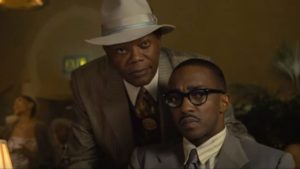The Banker
Posted on April 2, 2020 at 9:51 am
B +| Lowest Recommended Age: | Middle School |
| MPAA Rating: | Rated PG-13 for some strong language including a sexual reference and racial epithets, and smoking throughout |
| Profanity: | Some strong and racist language |
| Alcohol/ Drugs: | Drinking and smoking |
| Violence/ Scariness: | Some peril |
| Diversity Issues: | A theme of the movie |
| Date Released to Theaters: | April 3, 2020 |

First, it’s a heist in plain sight movie, and all, or pretty much all, strictly legal. Two black men, Bernard Garrett (Anthony Mackie) and Joe Morris (Samuel L. Jackson) start a business in the pre-Civil Rights Act era when it was not only legal but the universal practice to keep people of color not just out of the neighborhoods where white people lived and worked but out of the places that make property ownership possible, the business that sell homes and office buildings and the people who provide the financing for those purchases.
Second, it is a “My Fair Lady”-style Cinderella makeover fairy tale movie, about taking someone who has the heart to be more than he is and teaching him the language, manners, and skills necessary to have credibility in the highest levels of society, or, in this case, business and finance. Garrett and Morris need a white man to pretend to be the president of their enterprise, so they recruit Matt Steiner (Nicholas Hoult), a genial construction worker, and teach him their version of “the rain in Spain stays mainly on the plain,” how to do (or pretend to do) complex valuation computations in seconds and how to play golf, so he can display the (apparently) effortless credibility needed to do big-money deals.
Third, it is a very personal underdog story of heroes to cheer for, two very different men, both played with exquisite precision, working together against near-insurmountable odds to overturn a virulently oppressive system.
Garrett has a head for numbers even as a young boy, where he listens in on the conversations of men of business as he shines their shoes. As a young man, he understands that the ability to own property is as critical to financial stability, social parity, and equal opportunity as the kind of political organizing that is getting started at the same time. Morris is already a savvy businessman with clubs and real estate holdings. Their personalities are very different — one a quiet, devoted family man, the other a good-time guy. But they both know how things work. They know how to make themselves invisible, pretending to be limo drivers or janitors to get access to the places of power while their front-man pretends to know what he’s doing. (One problem with the film is its failure to give Nia Long more of a role than the ever-supportive wife, though this ever-talented actress lends the character some dimension.)
We know from the beginning, opening on a Senate hearing with some harsh questioning, that powerful people are going to try to stop Garrett and Morris from taking some of their power. This movie, with MCU star-power portraying real-life superheroes, gives some of it back to them.
Parents should know that this film has some strong and racist language, some sexual references, scenes in clubs and bars, and some historical depictions of racism.
Family discussion: What did Morris and Garrett have in common? Who is most like them today? What should they have done about Steiner?
If you like this, try: “Hidden Figures” and “Self Made,” and read more about Bernard Garrett and Joe Morris.
